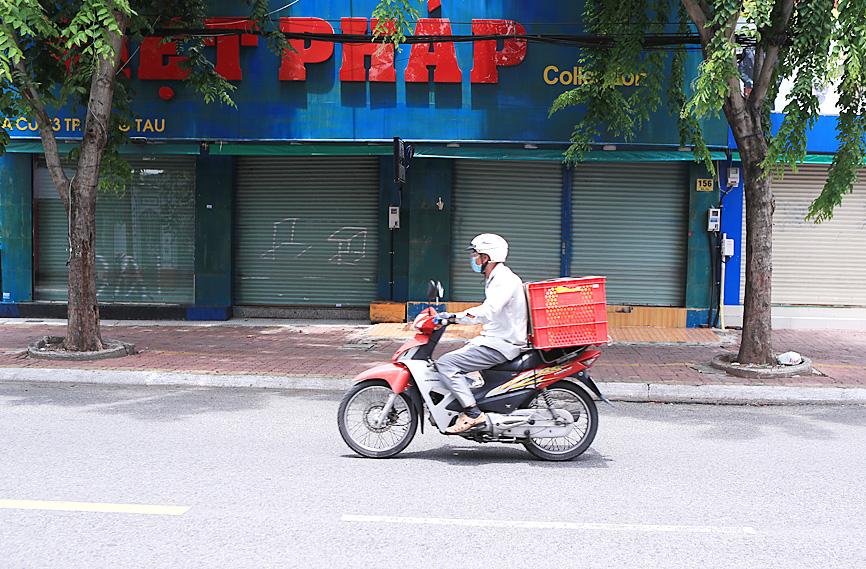Feng Tay Enterprises Co Ltd (豐泰), a supplier for Nike Inc, on Saturday temporarily shut down four factories in Vietnam, its biggest manufacturing base, for about a week amid COVID-19 lockdowns, it said yesterday.
Feng Tay is the latest in a slew of local manufacturers with operations in Vietnam that have suspended operations as the country grapples with its worst outbreak of COVID-19.
Pou Chen Corp (寶成工業), the world’s largest manufacturer of branded athletic and casual footwear, last week said that it had suspended operations at its plant in Ho Chi Minh City, as virus restrictions shuttered factories in the business hub through Friday. Pou Chen manufactures footwear for companies such as Nike and Adidas AG.

Photo: AP
Feng Tay halted operations at its major subsidiaries in Vietnam — Dona Victor Footwear Co, Dona Pacific (Vietnam) Co, Vietnam Dona Orient Co and Dona Victor Molds Manufacturing Co — through Friday, according to a company filing with the Taiwan Stock Exchange.
The company, based in Yunlin County’s Douliou City (斗六), said that the Vietnamese government has imposed stringent travel curbs in the Ho Lai and Pac Son areas, hindering some employees from working in the region.
Feng Tay would continue enhancing COVID-19 measures to prevent infections, it added.
Vietnam is Feng Tay’s biggest footwear manufacturing base, accounting for 52 percent of its total capacity, according to investors’ conference presentation material.
Last year, the Vietnamese factories produced 63 million pairs of sneakers, making up 56 percent of Feng Tay’s overall shipments of 112 million pairs.
Feng Tay last year shipped 9 percent fewer shoes than in 2019 as COVID-19-related restrictions in India forced the company to suspend production there for 37 days, leading to a 29 percent reduction in shipments annually from its Indian factories.
Feng Tay’s second-biggest manufacturing base is India, which contributes 26 percent to the company’s total capacity.
In May, Feng Tay shut down Indian factories for 18 days again due to outbreaks there.
Shoemaker Sports Gear Co (志強國際) yesterday also said it would suspend production at its Vietnamese factories for 14 days to Aug. 2 at the request of local governments.
The company plans to disinfect all factory areas during the period to help prevent COVID-19 infections, it said in a regulatory filing.
“As the third quarter is usually a slow season, the company would allocate production [from other factories] to reduce” the effects of the closures, Sports Gear said.
Textile supplier Eclat Textile Co (儒鴻), which counts Nike and Under Armour Inc among its customers, said it would extend shutdowns started on Saturday at its Vietnamese facilities to Friday.
Other Taiwanese companies with operations in Vietnam — including golf club producer Advanced International Multitech Co Ltd (明安國際), home decor manufacturer Ching Feng Home Fashions Co Ltd (慶豐富), bicycle components maker SR Suntour Inc (榮輪科技), Headway Advanced Materials Inc (展宇科技材料), Evertop Wire Cable Corp (億泰電線電纜) and King Chou Marine Technology Co Ltd (金洲海洋科技) — also said that they would suspend production at their Vietnamese units for up to two weeks.

Hon Hai Precision Industry Co (鴻海精密) yesterday said that its research institute has launched its first advanced artificial intelligence (AI) large language model (LLM) using traditional Chinese, with technology assistance from Nvidia Corp. Hon Hai, also known as Foxconn Technology Group (富士康科技集團), said the LLM, FoxBrain, is expected to improve its data analysis capabilities for smart manufacturing, and electric vehicle and smart city development. An LLM is a type of AI trained on vast amounts of text data and uses deep learning techniques, particularly neural networks, to process and generate language. They are essential for building and improving AI-powered servers. Nvidia provided assistance

GREAT SUCCESS: Republican Senator Todd Young expressed surprise at Trump’s comments and said he expects the administration to keep the program running US lawmakers who helped secure billions of dollars in subsidies for domestic semiconductor manufacturing rejected US President Donald Trump’s call to revoke the 2022 CHIPS and Science Act, signaling that any repeal effort in the US Congress would fall short. US Senate Minority Leader Chuck Schumer, who negotiated the law, on Wednesday said that Trump’s demand would fail, while a top Republican proponent, US Senator Todd Young, expressed surprise at the president’s comments and said he expects the administration to keep the program running. The CHIPS Act is “essential for America leading the world in tech, leading the world in AI [artificial

DOMESTIC SUPPLY: The probe comes as Donald Trump has called for the repeal of the US$52.7 billion CHIPS and Science Act, which the US Congress passed in 2022 The Office of the US Trade Representative is to hold a hearing tomorrow into older Chinese-made “legacy” semiconductors that could heap more US tariffs on chips from China that power everyday goods from cars to washing machines to telecoms equipment. The probe, which began during former US president Joe Biden’s tenure in December last year, aims to protect US and other semiconductor producers from China’s massive state-driven buildup of domestic chip supply. A 50 percent US tariff on Chinese semiconductors began on Jan. 1. Legacy chips use older manufacturing processes introduced more than a decade ago and are often far simpler than

Gasoline and diesel prices this week are to decrease NT$0.5 and NT$1 per liter respectively as international crude prices continued to fall last week, CPC Corp, Taiwan (CPC, 台灣中油) and Formosa Petrochemical Corp (台塑石化) said yesterday. Effective today, gasoline prices at CPC and Formosa stations are to decrease to NT$29.2, NT$30.7 and NT$32.7 per liter for 92, 95 and 98-octane unleaded gasoline respectively, while premium diesel is to cost NT$27.9 per liter at CPC stations and NT$27.7 at Formosa pumps, the companies said in separate statements. Global crude oil prices dropped last week after the eight OPEC+ members said they would